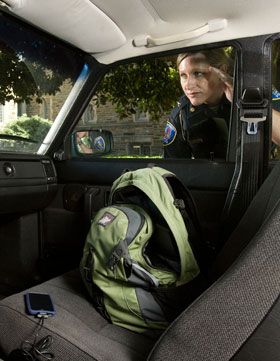Summer Safety on Duke's Campus
Duke Police offer summer campus safety tips

Life at Duke is much quieter during the summer for some. But many daily activities continue -- people still stroll Duke Gardens, take long walks along the Al Buehler Trail and attend summer classes and camps.
And just like during the rest of the year, Duke's police department reminds everyone to be mindful about leaving cars unlocked and belongings in view when parking on campus.
"Campus is busy for us during the summer," says Major Gloria Graham of the Duke University Police Department. "We handle everything from noise complaints to roommate disputes. But car burglaries start to go up this time of year. I bet we can go over to the Al Buehler Trail right now and find a car where someone's left their valuables right out in the open."
It may be common sense to keep expensive items out of plain view, but Graham says the lesson bears repeating each year as a new batch of students enters Duke's campus. Over the summer, Duke has a diverse population of largely transient people -- nearly 10,000 -- many of them enrolled in one of Duke's summer camps.
"We are there to assist and make sure criminals don't take advantage of young people," says Aaron Graves, the associate vice president for campus safety and security at Duke. "If you see something suspicious, we want you to call us."
One of those calls may prevent what is, according to both Graham and Graves, the most common crime on campus: theft. Laptops, iPods and GPS devices are the most vulnerable.
Graham and her colleagues devised the "Gotcha" program, which targets people who leave their belongings unattended. For example, an officer patrolling a Duke parking lot will notice an exposed electronic device and leave a "gotcha" note indicating that the item is vulnerable to theft. Sometimes an officer will ask the parking permit office to contact the vehicle owner.
"We obviously can't do that for everyone," explains Graham. "But the hope is that the word will spread and others will pay closer attention when parking."
Officers regularly patrol the lots, maintaining a presence that can deter thieves. Additionally, the department has seen a decrease in thefts at Duke Hospital since implementing the "Gotcha" program -- evidence, Graham says, that the initiative is raising awareness.
"At the end of the day, policing is policing," says Graham. "The key to campus policing is enhanced customer service. At Duke, we take every single crime seriously, so we are going to follow up and dust for prints."
There are 178 members of the campus police force serving Duke. They include officers along with security, emergency communications and support staff, many of whom also work closely with the Durham Police Department.
"There's not a real boundary between Durham and the Duke community," says John Dailey, who was appointed Duke's campus police chief in April. "It's important for us to understand the needs of the Durham Police Department and to collaborate to address those needs."
Each morning the Duke and Durham police departments hold joint briefings to coordinate patrols, and every other week they compare notes to see what areas need attention. The reports detail activity such as the location and types of crime and what was stolen in cases of larceny. The reports help identify trends from month to month and year to year.
"We want to protect the reputation of the university," Graves says of the partnership with Durham Police. "Bad things happen from time to time, but our combined efforts prevent them from happening more frequently."